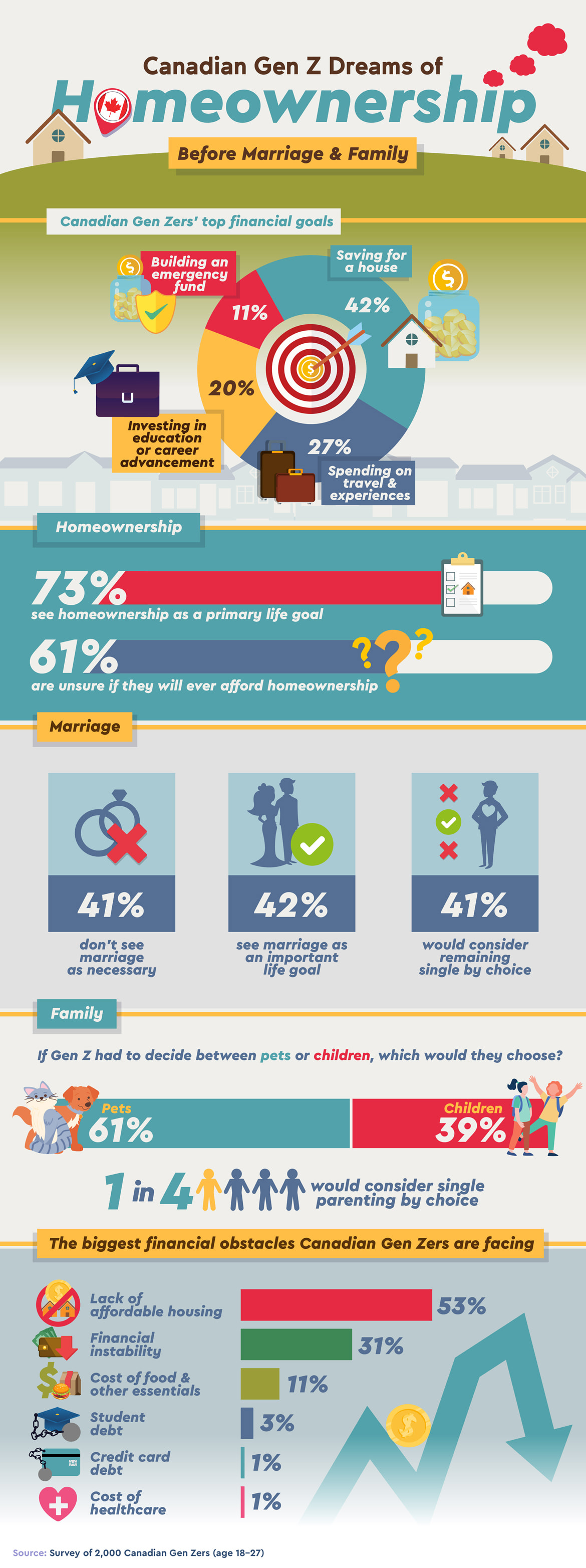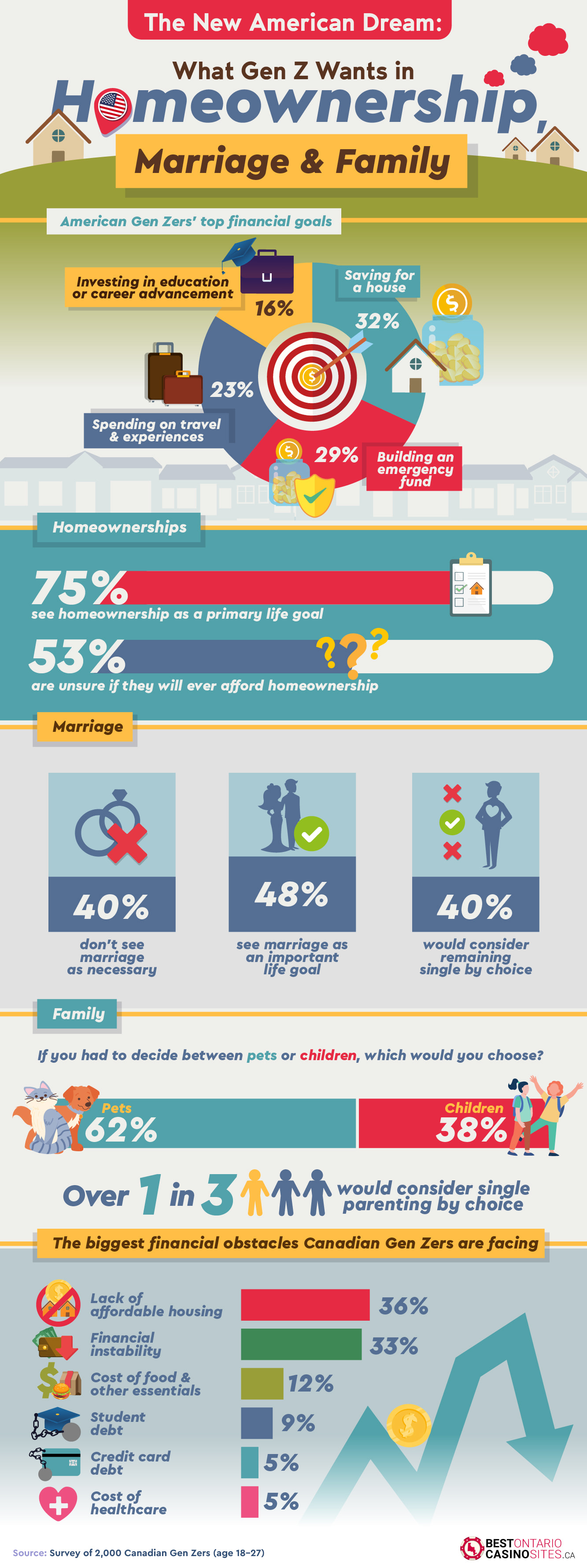
Every generation faces unique choices amidst cultural collisions. Just think: Fifty years ago, grandma wasn’t texting grandpa telling him she left her bedroom window unlocked—he was throwing a rock at it.
For Gen Zers, some of those collisions include: choosing to save and spend on a dream wedding or a dream house, the preference for fur children over real children, and the desire to find a partner versus embracing themselves as their partner. We’ve gathered data to explore the cultural and personal values that drive these shifts and choices, and how they’ve changed over time.
By surveying people in every state in the U.S. and the Canadian provinces, we were able to highlight the diverse perspectives and priorities that shape Gen Z lives and relationships—no cap.
Key Takeaways
- Both Canadian and American Gen Zers aspire to homeownership as a primary life goal, but more than half of both are unsure if they can afford it.
- A significant proportion of Gen Zers (40-41%) don’t see marriage as necessary, with many opting to remain single by choice, although a sizable group still finds marriage important.
- The majority of Gen Zers would choose pets over children, reflecting shifting preferences in family structure.
- The lack of affordable housing and financial instability are the primary financial obstacles faced by both Canadian and American Gen Zers.
- Gen Zers prioritize saving for a house, emergency funds, travel, and career advancement as their top financial goals.
- A notable 24% of Gen Zers view gambling as a viable investment strategy, with 48% of them exclusively wagering online and never at land-based casinos.
Gen Z Prioritizes Homeownership Over Marriage Amid Financial Uncertainty
Homeownership has always represented the (North) American dream—a significant aspiration even today for Gen Z in both countries. In Canada, 73% of Gen Zers see homeownership as a primary life goal, slightly less than the 75% in the U.S. But who will be living in those homes?
Views on marriage and family among Gen Zers in Canada and the U.S. reflect broader societal shifts towards individualism and flexibility when it comes to traditional life milestones. In Canada, 41% of Gen Zers do not see marriage as necessary, with a nearly equal percentage (42%) viewing it as an important life goal. In the U.S., 40% do not prioritize marriage, while 48% still consider it significant.

Even though achieving the dream of a house is a top goal for Gen Z over marriage, that likelihood is uncertain for many. In Canada, 61% are unsure if they will ever be able to afford a home, a sentiment shared by 53% of American Gen Zers. High real estate prices, particularly in urban areas and their outskirts, and an overall rise in the cost of living are common hurdles that both groups face, and are no doubt exacerbated by a general feeling of financial instability (howdy, seven-dollars-and-twenty-five-cents-an-hour).
It makes sense, right? Gen Z recognizes there is already too much chaos in the world, and sometimes it’s easier to enclose yourself between four walls and a ceiling than try to share that space with someone else. A beautiful home is the new GOAT goal.
Pets Over Kids: How Gen Z is Redefining Family and Financial Goals
When it comes to family and financial goals of Gen Zers in Canada and the United States, a few key trends emerge—and not shockingly, several are the same for both groups.
In Canada, 42% of Gen Zers prioritize saving for a house when it comes to their bank accounts, followed by spending on travel and experiences (27%), investing in education or career advancement (20%), and building an emergency fund (11%). Homeownership + travel = over two-thirds of overall financial priorities, reflecting the need for a balance between stability and adventurous life experiences.

In the United States, the priorities are slightly different—but saving for a house is still at the top of the primary goal list for 32% of Gen Zers. An over-double the amount (29%) are dead set on building an emergency fund; representing a greater concern for financial security (don’t make us minimum wage speak again). Spending on travel and experiences is a top aim for a significant 23%, with investing in education or career advancement at a fairly low 16% (student loan debt, anyone?).
When it comes to the idea of family, Canadian Gen Zers love their pets—with 61% preferring them over children. And American Gen Zers? Even a few more at 62% prefer having pets compared to children. After watching boomer generations and beyond stay cemented in the same place for decades (while blaming everything on the kids), Gen Z is keen to adopt lifestyles that allow for greater flexibility and fewer long-term commitments.
Being a single parent used to represent hardship or instability to even some millennials, but over one in four Canadian Gen Zers and one in three American Gen Zers are open to this possibility—at will. This readiness and bravery to embrace non-traditional family structures showcases a broader acceptance of diverse dynamics and an emphasis on personal autonomy this specific generation is known for. Yeet!
Financial Obstacles: Navigating Economic Challenges
Ambitious, altruistic, and pragmatic, Gen Zers in both Canada and the U.S. face significant financial obstacles, perhaps more than any other generation. A lack of affordable housing is the most pressing issue, affecting a way-too-high 53% of Canadian Gen Zers and a-still-too-high 36% of their American peers.
Financial instability is the second major concern of both groups, impacting 31% of Canadian Gen Zers and 33% of Americans. This overarching anxiety is likely because of worldwide and North American economic hardships and fluctuations, including the cost of food and other essentials (with 11% of Canadians and 12% of Americans citing it as a significant obstacle).
Student debt and credit card debt are less of a concern for Canadian Gen Zers, with 3% and 1% citing them as issues, respectively. These are more prominent issues in the U.S., affecting 9% and 5% of American Gen Zers, likely stemming from the school systems and rising costs of higher education (and having to pay for healthcare) as compared to their northern neighbors.
Additionally, attitudes towards gambling reveal another dimension of Gen Z’s financial strategies and risks. Surprisingly, 24% of Gen Zers see gambling as a form of investment. However, there is a clear preference for the online sphere, with 48% of them having only wagered at online casinos and never bet at an in-person casino.
Conclusion
Get the mortgage, skip the ring; adopt the dog, skip the kid; eat the mung bean, skip the meat. Generation Z may have all the rizz, creating an odd gateway for rad nineties trends to surface—but don’t their overall priorities sound pretty solid?
Understanding these nuances gives valuable insight into what will help support a resilient and fulfilled future for all of Gen Z in North America—a responsibility of all other generations who want the world to stay intact. Iykyk.
Methodology
This survey was conducted in May 2024, among 2,000 Gen Z Canadians (age 18-27) and 2,000 Gen Z Americans (age 18-27) by bestontariocasinosites.ca.
In Canada, participants identified themselves as 61% women, 35% men, and 4% non-binary. American survey participants identified themselves as 61% women, 34% men, 4% non-binary, and 1% other.
